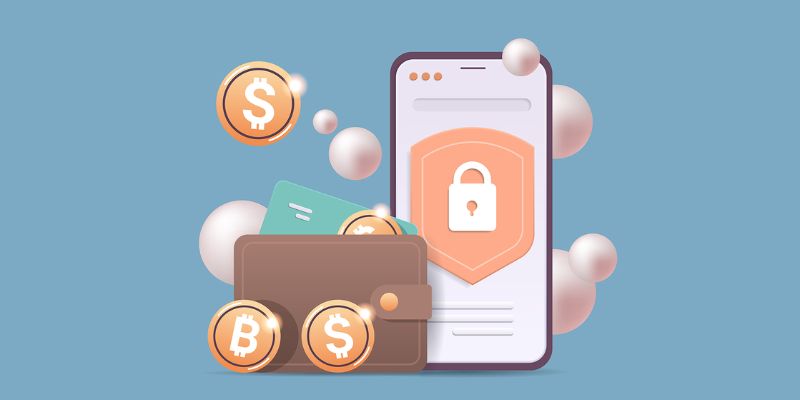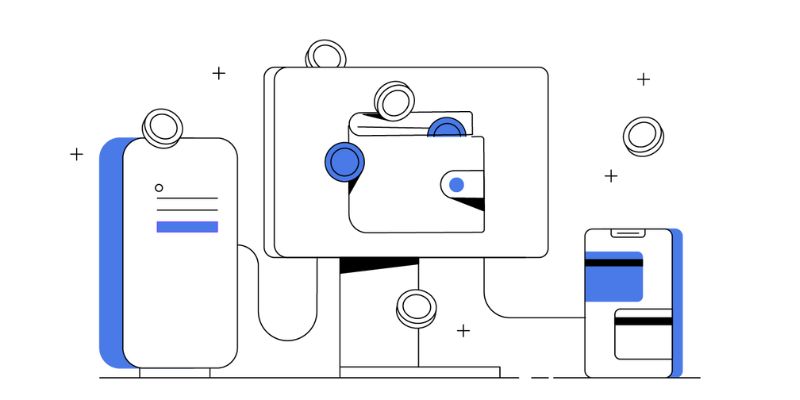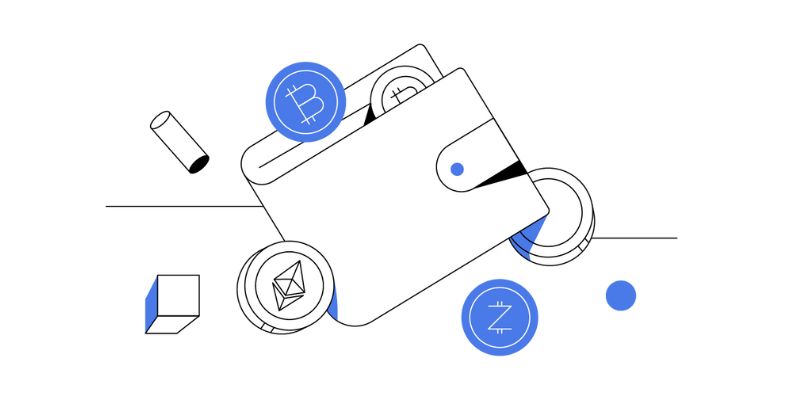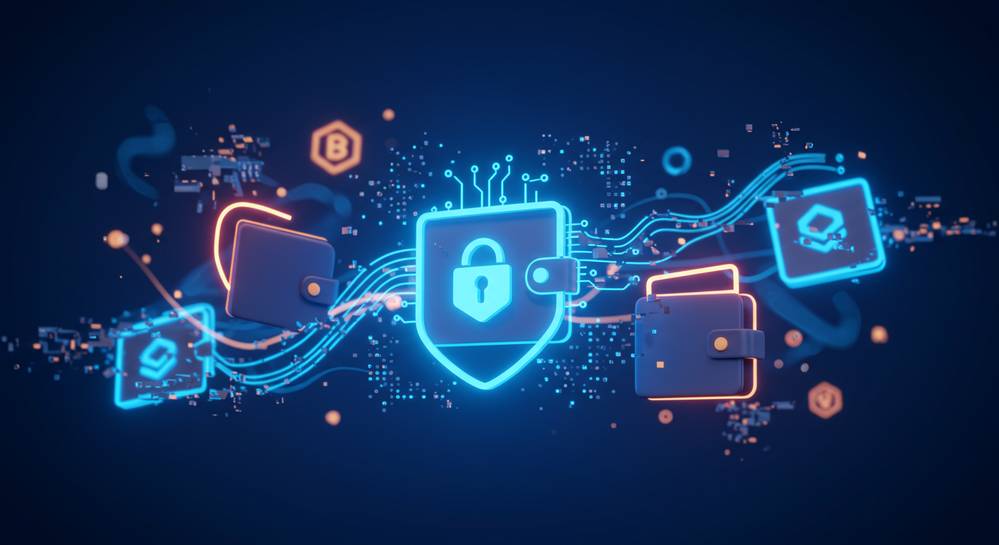Diving into the world of digital currencies means choosing the right wallet. The question is, should it be a mobile crypto wallet vs desktop wallet? As a seasoned trader, I’ve navigated the maze of options to help you pick the winner for your trading style. Each has its perks and pitfalls, shaping the way you trade and secure your coins. I break down the essentials, from basic security to advanced features, making it clear which fits your crypto life best. Ready to make an informed choice? Let’s get started!
Understanding the Fundamentals: Mobile versus Desktop Wallets
Distinct Functionalities and Basic Security Measures
I see wallets in two lights: mobile and desktop. Let’s dive in. Mobile wallets live on your phone. They make spending and receiving cryptos easy. Think of them like a wallet in your pocket. Desktop wallets? They sit on your computer. They favor heavy-duty tasks over quick coffee shop payments.
With mobile wallet security, you must stay sharp. They could get lost or face theft. Still, they’re made safe with codes and fingerprint locks. Some even have wallet encryption technology. This keeps your cash locked tight. Always back these wallets up. You’ll thank yourself if your phone takes a dip.
Desktop wallets boast their own perks. They offer strong desktop wallet security. This is thanks to their limited exposure to the web. Still, threats exist. Like trickster programs trying to dupe you. So, keep your computer free from invaders. Also, always have a copy of your wallet elsewhere. Machines can crash!
The Nature of Cryptocurrency Storage Options
When we talk about cryptos, we can’t miss storage options. What you pick matters. For hot wallets, think online and ready. They let you trade fast but stay connected to the net. This can be risky. For cold storage solutions, think safe and disconnected. Think of private keys locked offline but harder to reach for quick buys.
The choice between mobile and desktop wallets is often about balance. Want to buy something quick? Mobile wallets lead the charge. They’ve got mobile wallet features like scanning QR codes. No need to type long addresses. But desktop wallets cater to the focused trader. They provide a wider screen and an easier look at detailed charts.
Desktop or mobile, accessing your wallet should be easy. Mobile wallets shine here with their anytime, anywhere promise. Desktop wallets need a seat at a computer. But they make up for it with power and broader desktop wallet advantages.
And you can’t ignore updates! Mobile wallet updates come often. They keep you safe. Desktop wallet updates do the same for your home setup. The key is installing them as soon as they pop up.
Making sense of it all? Great! Use these nuggets. They’ll help you weigh mobile versus desktop wallets. And they’ll guide you to the best home for your digital coins. Choose wisely, friends. Your cryptos are counting on you.

Analyzing Security and Privacy Features
Private Keys Management and Wallet Encryption Technology
When choosing a crypto wallet, think security first. Your private keys are the secret codes that unlock your coins. Mobile wallet security and desktop wallet security both aim to protect these keys. But how they do it varies a lot.
Mobile wallets keep crypto in your pocket, handy for quick trades. But remember, phones get lost and stolen. Good mobile wallets guard your keys with strong wallet encryption technology. They turn your keys into hard-to-crack codes.
Desktop wallets, however, store keys on your computer. They’re safer from theft as long as you keep your computer secure. But they’re at risk if your computer gets hacked. Always check for desktop wallet updates to protect against bugs and hackers.
Secure Crypto Transactions and Two-Factor Authentication
Next up, let’s talk about sending and receiving crypto safely. Secure crypto transactions matter on both mobile and desktop. Each click should be safe and sound. Two-factor authentication (2FA) adds a layer of safety by asking for a second code when you log in or send coins.
Think of it like this: your wallet needs two keys to open, one you know and one your phone or an app gives you. Wallets with 2FA, like a lock with two bolts, are tougher for thieves to crack. Whether you use mobile or desktop, 2FA keeps you safer.
All this said, no wallet is 100% safe. Hackers and bugs happen. Always have a backup plan like writing down your recovery phrases. It’s like keeping a spare house key. If your wallet gets lost or stops working, your backup helps you get back in.
We’ve talked about private keys, encryption, and keeping transactions safe. These are the big deals in wallet security. Mobile wallets offer you trading on the go, while desktop wallets can be sturdy fortresses. Decide what fits your life best. And hey, you don’t have to pick just one – many traders use both for balance.
Remember to keep your software fresh and use tools like 2FA. Stay sharp out there, and pick a wallet that’s a tough nut for any troublemakers to crack.

User Experience and Accessibility: Convenience or Complexity?
Mobile Wallet Features: Pros and Cons on the Go
When choosing a crypto wallet, think about how you live. Are you always on the move? Then a mobile wallet might be your best bet. With it, you can send money as easily as a text message. Pay for coffee with a scan of a QR code. Check your balance while in line at the store. These are neat mobile wallet features that add up to a big win for convenience.
But here’s the deal: mobile wallets are hot wallets. This means they’re connected to the internet, and this brings some risk. What if someone gets their hands on your phone? They might access your funds. That’s a scary thought. Mobile wallet security is your armor here. Good mobile wallets ask for a pin or use your fingerprint to lock the app. Even better, some give you two-factor authentication. This is like a double lock on your digital money box.
For folks who want to hold multiple types of coins, multi-currency support is a plus. Some mobile wallets can hold lots of different cryptocurrencies. This means you don’t need a bunch of apps taking up space on your phone.
Yet, mobile wallets aren’t perfect. They can have high-risk vulnerabilities. Hackers are smart and they’re always trying to find holes in mobile wallet security. But you can fight back by keeping your mobile wallet updated. New updates usually fix those holes so the bad guys can’t sneak in.
Backing up your mobile wallet is also key. If you lose your phone, you don’t want to lose your money too. Make sure you know how to backup and recover your wallet.
Desktop Wallet Interface and Advantages for Dedicated Trading
Maybe you spend most of your time at a desk. Or maybe you trade a lot of crypto. A desktop wallet could be your friend here. It has a bigger screen, which means a clearer desktop wallet interface. This makes managing trades easier since you can see more info at once.
Desktop wallets are often more secure than mobile ones. Think of them like a strong safe. They’re not as easy to steal because they sit on your computer. They still connect to the internet, though. This means desktop wallet security is important too. Like mobile wallets, updates and backups are your best defense. Private keys management is easier on desktop wallets because you can see more and make fewer mistakes.
If you have a nice chunk of digital coins, you might like desktop wallets for their cold storage solutions. This is like having a safe inside a safe. It keeps your coins off the net when you’re not trading. It’s super safe.
Desktop wallets are not without their downsides. They aren’t as handy as mobile wallets. You can’t just pull out your computer to pay for a snack. Also, bad things like viruses or hard drive crashes could wipe out your desktop wallet. So, stick to the plan: update, backup, and keep your eyes open for anything odd.
Picking between mobile and desktop wallets isn’t easy. It’s all about how you live and trade. What fits you best is the right choice.

The Future of Wallet Technology and Best Practices for Users
Choosing a Crypto Wallet Fit for Your Lifestyle
Finding the right wallet to store your digital cash is a big deal. Just like you wouldn’t pick any old wallet to hold your physical cash, you need a good one for your cryptocurrency. The battle between mobile and desktop wallets is real. Let’s dig into which one might be your best buddy.
Mobile wallets travel with you. Pay for coffee or send cash with a few taps. This makes them top-notch for convenience. But what about mobile wallet security? The answer: pretty solid, especially with the latest wallet encryption technology. Mobile wallets guard your private keys, using things like pin codes and biometric checks. However, risks lurk when you lose your phone or face sneaky hackers.
Desktop wallets sit snug on your computer. They’re hard to beat if you love a bigger screen and need to handle loads of transactions. Desktop wallet security shines by cutting the cord from online threats when your computer is offline. But, remember to watch out for viruses and phishing attacks.
For the movers and shakers, mobile wallets win with ease of use. Going from one coin to another is a breeze. With a tap here and a scan of a QR code there, you’re in business. On top of that, staying up to date with mobile wallet updates can be as easy as updating your favorite game app.
Life at the desk means desktop wallets give you a serious setup. You get more room to view your stash and deeper control like setting up a multi-currency support system.
Choosing a wallet, in the end, is choosing a lifestyle. Do you need quick taps or big-screen stats? Pick a wallet that fits how you move and shake in the crypto world.
Wallet Updates and Recovery Options: Staying Ahead of Risks
In the crypto space, keeping ahead of risks is non-negotiable. Staying sharp with wallet updates and recovery options is smart. Both mobile and desktop wallets offer updates. Always do them. They pack in the latest security tricks to keep your treasure safe.
But what if things go south? Say hello to wallet recovery options. Whether it’s forgetting your PIN or a tech hiccup, you must know how to get your goods back. Backing up cryptocurrency wallets falls under best practices – do it and sleep well. Both wallet types usually offer solid backup options.
Recovering a mobile wallet might involve writing down a recovery phrase. For desktop wallets, it could be a backup file. The goal’s the same: get your crypto back.
Keep your software updated. Don’t lag on this. Desktop wallet updates can protect you from the latest threats lurking on the web. They can also enhance your desktop wallet interface to make trading smoother.
Deciding between a mobile or a desktop wallet doesn’t have to be hard. Think about your day and pick a wallet that fights the risks while fitting in your pocket or on your desk. Your digital cash deserves a good home, just like you. Choose wisely, stay updated, and protect your crypto journey.
In this blog, we dove into the differences between mobile and desktop wallets, shared key security tips, and considered comfy versus complex features. We saw how mobile wallets let you trade on the move but may lack some safety perks, while desktop ones offer more control for serious trading. Looking ahead, we know wallet tech will keep evolving. So, always pick one that fits your life but don’t forget to stay sharp on updates and backup plans. Keep your crypto safe and your mind at ease by making smart wallet choices. Trust in knowing the ropes and you’ll nail it!
Q&A :
What are the main differences between mobile crypto wallets and desktop wallets?
Mobile crypto wallets are applications you can download to your smartphone, offering convenience and portability, allowing users to access their cryptocurrency wherever they go. Desktop wallets, on the other hand, are software programs that reside on personal computers, often providing enhanced security features and more comprehensive management tools due to their larger interface and more robust computing power.
Which is more secure, a mobile crypto wallet or a desktop wallet?
The security level of a wallet depends on various factors such as the user’s security practices and the wallet’s design. Desktop wallets often have the edge in security as they’re less susceptible to malware compared to mobile devices that are frequently connected to various networks and used for different purposes. However, high-quality mobile wallets with strong security measures can also be very secure.
Can I use the same crypto wallet on both mobile and desktop platforms?
Some crypto wallet providers offer cross-platform wallets that can be used on both mobile and desktop devices. These wallets maintain the same level of security and allow seamless synchronization between devices. It’s crucial to ensure that the wallet provider has a strong reputation and employs robust security practices to protect your assets on both platforms.
How do I choose between a mobile crypto wallet and a desktop wallet?
Choosing between a mobile and a desktop wallet depends on your lifestyle and investment needs. If you need to access your cryptocurrency on the go and prioritize convenience, a mobile wallet might be best for you. If you trade large amounts of cryptocurrency, value security features over portability, or if you’re a frequent user of crypto-related applications that require a desktop interface, a desktop wallet could be the more appropriate choice.
Are there fees associated with transferring cryptocurrency between a mobile wallet and a desktop wallet?
Transferring cryptocurrency between wallets typically involves network fees, which are not dependent on the type of wallet you use but the cryptocurrency network itself. These fees are required to compensate miners or validators for processing the transactions. However, the actual amount of the fee can fluctuate based on network congestion and the specific cryptocurrency being sent.



